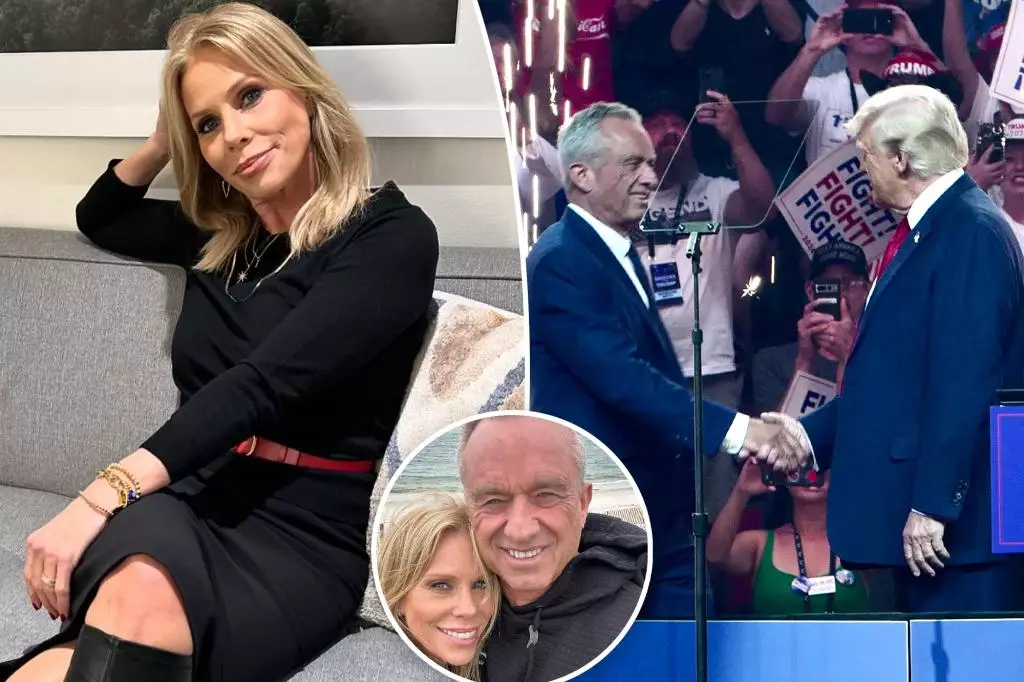The relationship between Cheryl Hines and Robert F. Kennedy Jr. boasts a complex narrative, wrapped not just in love but also an intricate web of political allegiances and personal betrayals. Recent rumors indicate that this marriage, spanning over a decade, may be reaching its breaking point, primarily due to Kennedy’s political affiliations and alleged infidelities rather than any specific individual, including journalist Olivia Nuzzi. This article explores the dynamics of their relationship, the intersections of personal and political realms, and the implications stemming from Kennedy’s choices.
Hines, a staunch Democrat, appears to be grappling with more than just her husband’s personal indiscretions. Reports hint that her discontent is rooted deeply in Kennedy’s surprising shift towards the MAGA movement, a move that seems to contradict his heritage as part of one of America’s most prominent Democratic families. The betrayal cuts deeper than mere ideology; it presents a stark dichotomy within their life together. The schism between her longstanding political beliefs and his newfound affiliations with Donald Trump may prove too significant to reconcile.
Kennedy’s endorsement of Trump is not merely a political maneuver—it signals a dramatic shift not only in his career trajectory but also in the personal realm. Sources suggest that Hines felt blindsided by the endorsement, leading to feelings of embarrassment and frustration that could potentially dissolve their union. Such sentiments depict a woman caught in a whirlwind of conflicting feelings, fiercely loyal yet disillusioned by the stark contrast between her values and her husband’s actions.
The allegations of an affair between Kennedy and journalist Olivia Nuzzi have further fueled speculation about the state of Hines and Kennedy’s marriage. Reports assert that Hines was blindsided by this development, leading to growing concerns among her friends that she may end the marriage as a result. While Kennedy’s history as a “serial philanderer” may not have surprised Hines, the timing and implications of this affair likely cross a line that challenges her commitment.
Despite knowing that she married a member of the notorious Kennedy clan—often noted for their romantic escapades—Hines’ expectations were likely altered by their years together. Many believed that as Kennedy aged and matured, he would have begun to grapple with his past reckless behavior in favor of a more stable family life. The affair with Nuzzi, alongside the political shift, could represent a resurgence of traits Hines believed her husband had outgrown.
Social media and online discussions amplify the fallout of personal crises. Hines’ visible reactions to her husband’s actions—initially spotted sans her wedding ring—sparked dialogue across platforms about the nature of betrayal in the limelight. When sources reported that some factions of the Trump camp harbor animosity towards Hines due to her political stance, the personal crisis morphed into a broader societal commentary on how political affiliations can complicate relationships.
As Kennedy orbits this contentious political sphere, it poses a significant question for Hines—how does one remain personally grounded when their partner wades into such treacherous waters? The answer seems muddled, as they are trapped between personal affection and the harsh realities of public scrutiny in a politically charged climate.
The evolving story encapsulates more than just marital discord; it highlights the pervasive influence of external circumstances—including political allegiances and societal expectations—on personal relationships. Hines now finds herself at a crossroads: navigating the consequences of her husband’s choices while preserving her identity and values. The notion of potential separation, suggested by insiders, raises fundamental questions about love when juxtaposed against the backdrop of betrayal.
Ultimately, Kennedy’s decisions serve as a microcosm for larger debates about loyalty and alignment within both marriage and politics. As Hines weighs her options, she must consider not just the immediate implications of her husband’s actions, but also the longer-term effects on her life, her career, and her relationship with the public.
Through the lens of Hines and Kennedy’s tumultuous relationship, we catch a glimpse of how intertwined personal and political lives can become, often leading to conflicts that challenge the very foundation of love and partnership. As the situation unfolds, it remains to be seen whether love can prevail amidst the chaos or if Hines will carve her own path apart from Kennedy’s shadowy past and controversial present.

